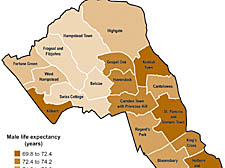|
|
 |
| |

Map showing male life expectancy in Camden
|
Near neighbours who have an 11-year gulf in life spans
Health survey reveals how deprivation means you can expect to die earlier
HOW your wealth affects your health has been highlighted in the annual report of Camden Primary Care Trust (PCT).
The health authority, responsible for the well-being of the 243,000 people registered with Camden GPs, compiled the wide-ranging survey with the help of Whitehall-backed research and other social and health services in the borough, including the Town Hall, voluntary and community groups.
Compiled by leading public health specialist Dr Anthony Kessel, the report highlights how people living in the borough’s poorer wards have a much lower life expectancy.
Dr Kessel said: “Deprivation varies widely across the borough, as does health. There is an 11-year difference in male life expectancy between the wards of Hampstead Town (81.1 years) and St Pancras and Somers Town (69.9 years).”
The report finds lifestyles, affected by income, employment and leisure, have a devastating impact on people’s health. Housing plays a major role in how long you can expect to live.
Dr Kessel said: “Being homeless or living in temporary accommodation is strongly associated with a range of significant difficulties.
“Children living in bed and breakfasts have been found to be at increased risk of behavourial problems, stress, poor sleep, infections and gastro-intestinal problems.”
But you do not have to be homeless for housing to have a bad effect on your well-being.
Dr Kessel added: “It is widely acknowledged that housing conditions have a significant impact on a range of public and personal health issues. The first Public Health Act in 1948 acknowledged the health gain from eliminating unfit homes.
“Yet there are still significant numbers of people who live in poor-quality housing. It has been estimated that 78 per cent of local authority-owned dwellings in Camden fall below the government’s decent homes standard.” He added that 13 per cent of private homes would also fail a government health and safety test.
“Clearly, there are significant challenges in this area,” Dr Kessel added.
But the report found improvements in many of the social and environmental factors that affect people’s health.
Dr Kessel said: “Crime and unemployment have been falling, as have serious road accidents, for both adults and children. These issues are not always thought of in terms of public health but they are very important.”
The report highlights the causes of death for the 1,400 Camden residents who pass away each year.
The most common causes of death are cancer (25 per cent), coronary heart disease (19 per cent) and respiratory system disorders.
Dr Kessel said: “A lot of people smoke in Camden. The prevalence here is about 30 per cent, and 17 per cent of Camden’s deaths are due to smoking.
“Considerable work is going on in Camden to reduce illegal sales of cigarettes and to reduce sales to minors. In 2005 and 2006, 1,523 people stopped smoking with the help of Camden’s ‘stop smoking’ services.”
Dr Kessel believes that when the nationwide ban on smoking comes into effect next summer the numbers of smokers will fall even further.
On the fight against fat, the report notes that, although weight problems have become more pronounced throughout the country in recent years, in Camden people are less likely to be obese than in other parts of Britain.
Figures for obesity in Camden are about 15 per cent of the population, compared with a national figure of 22 per cent.
And nearly a third of all men and women take what the report terms “sufficient exercise” regularly to make them healthier.
The PCT says that, with finite resources, it has to determine priorities – and the report has helped highlight how it can do most good.
The report says: “Scientific evidence is overwhelming that health would improve dramatically if a reduction in smoking, obesity and alcohol consumption could be achieved, and the take-up of preventative sexual health, mental health services, immunisation and screening services could be improved.”
It adds that the ill effects of poor lifestyle are not just a personal matter, but have profound consequences for families, friends and the community.
Recent scares over the safety of the MMR vaccine – a one-jab inoculation to protect children against killer diseases measles, mumps and rubella – have brought a drop in the take-up of the vaccination, currently at about 70 per cent of children in the borough.
The report says: “When the stories were in the national press it was an issue. Across London numbers fell, despite there not being evidence that showed there was a link between MMR and autism. More studies have shown there is no link.
“Over the last two years the numbers have slowly and steadily been rising, but it is still a big challenge to get them to the rates required to eradicate measles. We need to get more than 90 per cent to eradicate the disease.
“But we are not here to tell people what to do. Instead, we need to make sure they have all the information they need to make an informed choice.”
Dr Kessel added: “Most of all, good public health is about groups working together – the council, GPs, social services. There are hard decisions to be taken about priorities but we need to be explicit and up front about them.”
|
 |
|
 |
|